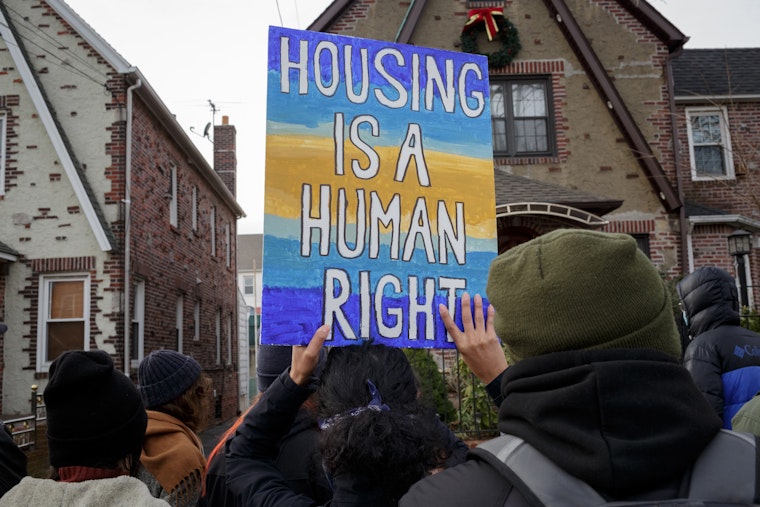COVID-19 Will Lead to Long-Term Housing Insecurity. Governments Must Step In.
By Padraic Kenna and Marguerite Angelari

"I have nowhere to go—I see myself ending up on the streets,” one 30-year-old female asylum seeker in the UK told The Guardian last November just as the country's new COVID-19 cases were beginning to peak in the tens of thousands. Over the last year, the pandemic led to homelessness for tens of thousands of people in the UK, from refused asylum seekers, ostensibly protected by a high court order, to workers in precarious service industry jobs. The UK government has extended a national ban on evictions until May 2021, but some warn that many have already been evicted due to loopholes.
The UK is not alone. From country to country, the COVID-19 crisis has revealed a too often hidden housing crisis, adding to the 1.8 billion people globally who lived in “grossly inadequate” housing conditions and homelessness before the pandemic. Despite regulations designed to prevent homelessness during the pandemic, evictions have not only continued but also, in certain jurisdictions, accelerated. Pouring fuel onto the flame of long-term housing insecurity, we are witnessing new spikes in virus cases, the lifting of evictions moratoriums, and permanent job losses.
Adequate housing during a pandemic can be a question of life and death by allowing for social distancing and proper sanitation. In fact, between March and September 2020, the termination of U.S. state moratoria on evictions could have caused as many as half a million excess COVID-19 cases, and over 10,000 additional deaths. Those at the bottom of the income ladder pay the heaviest price, and face the worst long-term consequences. In March of this year, an analysis of court data showed that New York City neighborhoods hit the hardest by COVID-19 also have the most eviction cases. The neighborhoods are largely Black and Latino, and home to the city’s essential workers.
Elsewhere, the past year has also seen horrific instances of abuse against some of the most vulnerable people in the world: those in informal or temporary housing settlements. In Italy, police forcefully evicted Roma families from temporary settlements, despite a government decree which suspended evictions throughout Italy. In Kenya, the government destroyed the homes of thousands of people who were forcefully evicted from the Nairobi informal settlements of Kariobangi and Ruai. Nearly one quarter of the world’s urban population lives in informal settlements or encampments, but housing for these groups, who already face discrimination, is rarely protected by domestic law or government support.
However, some governments have taken encouraging steps to protect housing during the pandemic. The Open Society Justice Initiative reviewed the most common measures taken by various governments between March and June 2020 at the onset of COVID-19. The survey found that at least 20 countries implemented some sort of eviction ban at a national or sub-national level. What's more, at least 22 countries implemented additional measures to protect tenants, such as rent freezes or deferrals, lease extensions, or rent assistance. More than a dozen governments imposed mortgage moratoria to allow borrowers to defer payments.
Nevertheless, we found that gaps in laws and regulation often left some groups to fall through the cracks. In some jurisdictions, measures covered groups like renters at the exclusion of others, such as distressed mortgage holders. Moreover, some protections were legally mandated, while others relied on voluntary agreements with lenders’ and landlords’ associations. Compounding these legal and regulatory shortfalls is the reality that many tenants do not know their rights or are unfamiliar with the rules that apply to them, allowing unscrupulous landlords to use loopholes to evict or informally pressure tenants to leave. For instance, in the U.S., despite a moratorium issued by the federal Centers for Disease Control, legal challenges to remove tenants rose across the country.
One year into the pandemic, many housing measures have expired, or will expire soon. Lawmakers should heed advocates like Leilani Farha, who, in her last report as UN Special Rapporteur on the right to housing, urged governments to implement eviction bans, mortgage payment deferrals, and measures to protect tenants in rental housing. The many shortcomings in domestic legislation worldwide, and the fact that we remain far from the end of the pandemic, underlines the need for countries to enact comprehensive emergency housing legislation that protects the right to housing in the long term.
Last year, the Justice Initiative joined housing and human rights groups to unveil model legislation intended as a blueprint for implementing the right to housing into domestic law. Comprehensive legislation, such as the kind that we and others have championed for months and shared with the public, can be adopted by legislators to build upon existing domestic measures, to include all elements of the right to housing already enshrined in international law.
Housing crises around the world are ticking time bombs—which, if ignored, will have major social and political consequences. The COVID-19 pandemic has resulted in unprecedented state action to protect health. This experience offers a glimpse of what could be done with a similar commitment to housing and human rights. This model legislation offers an avenue to build upon these historic developments and integrate the right to housing into every country’s actions.
Padraic Kenna, Ph.D. is a lecturer in law at the National University of Ireland, Galway where he directs the Center for Housing Law, Rights, and Policy. He has been an advocate for the right to housing for many decades.
Marguerite Angelari is senior legal officer for the Open Society Justice Initiative.
